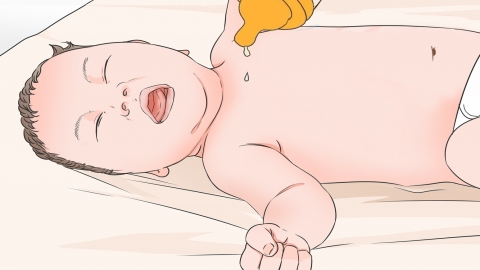What to do if a one-year-old baby has diarrhea
Diarrhea in a one-year-old baby could be caused by food intolerance, improper feeding, abdominal coldness, lactose intolerance, or bacterial enteritis. Management depends on the specific cause. Parents are advised to take the child to the hospital promptly for diagnosis and follow medical guidance for appropriate treatment.

1. Food intolerance: Enzymes in an infant's intestines may be insufficient to break down components in food, such as lactose or fructose. This can lead to undigested food residues fermenting in the intestine, producing gas and water, which may cause diarrhea. It is recommended to adjust the diet and temporarily avoid foods that may trigger intolerance, such as dairy products containing lactose.
2. Improper feeding: The gastrointestinal function of a one-year-old baby is not yet fully developed. Improper feeding, such as providing excessive fatty or high-protein foods, may overload the digestive system and cause diarrhea. Parents should adjust the baby's diet, choosing light and easily digestible foods such as rice porridge and noodles.
3. Abdominal coldness: If the baby's abdomen gets chilled, it may cause intestinal dysfunction, leading to diarrhea. Parents should ensure the baby stays warm, especially in the abdominal area, to avoid cold exposure. A warm water bag may be applied to the baby's abdomen, and clothing should be adjusted appropriately to prevent chilling.
4. Lactose intolerance: If the baby is lactose intolerant, they may be unable to fully digest lactose in milk, which can ferment in the colon and produce gas, causing bloating, diarrhea, and other symptoms. Parents should choose lactose-free formula or formula supplemented with lactase enzyme preparations to reduce lactose intake.
5. Bacterial enteritis: Bacterial infection can cause bacterial enteritis, in which bacteria and their toxins damage the intestinal mucosa, triggering an inflammatory response that leads to diarrhea, possibly accompanied by high fever, abdominal pain, and other symptoms. Under a doctor's guidance, parents may administer medications such as amoxicillin granules, cefixime granules, or bismuth potassium citrate tablets to improve the condition.
Parents should closely monitor changes in the baby's symptoms. Additionally, maintaining dietary hygiene, appropriately adjusting the diet, and enhancing the baby's immunity are important for preventing diarrhea.






